|

Spring
2000 (8.1)
Pages
68-69
Changes in Azerbaijan's
Educational Landscape
by Isgandar
Isgandarov, Deputy Minister of Education
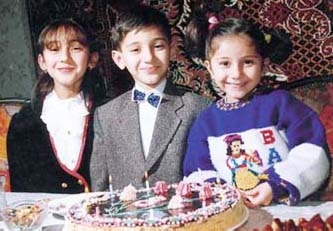  So much has changed
during the last decade in regard to alphabet and language usage
in our country. So much has changed
during the last decade in regard to alphabet and language usage
in our country.
Left: More and more parents
are sending their children to Azeri-track schools rather than
Russian-track schools because they want them to be fully versed
in their native language. But the lack of Azeri-language textbooks
is a serious problem.
One of the first
laws passed by Azerbaijan's Parliament after the collapse of
the Soviet Union, when our country gained its independence, was
the adoption of the Latin script to replace Cyrillic, which had
been imposed on us in 1939 by the Communist regime.
In fact, this event somehow put an end to the unprecedented "experiment"
of changing the alphabet, which has occurred four times during
the 20th century, primarily on the initiative of the Soviet government.
But at a much deeper level than alphabet usage are the perceptions
and attitudes towards national language that are changing. Though
Azeri used to be "on the books" as one of our national
languages during the latter years of Soviet rule, still Russian
was much more dominant, especially among the individuals who
held the highest professional positions. Only those who mastered
Russian attained those ranks in government, science, medicine
and academic life.
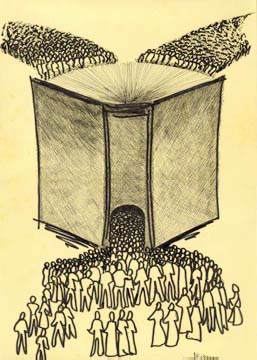  Soviet government and
Communist ideology directed its power to the propaganda and development
of the Russian language. National languages, including Azeri,
were not allowed to enter the orbit of the Russian language. Soviet government and
Communist ideology directed its power to the propaganda and development
of the Russian language. National languages, including Azeri,
were not allowed to enter the orbit of the Russian language.
Left: During the Soviet period,
a two-track system (Azeri vs. the more prestigious Russian) became
widespread. Today the goal is to strengthen Azeri instruction
to equal the Russian education.
Today, now that Azerbaijan is independent and its Constitution
declares that Azeri - and only Azeri - is our State language,
public attitudes are gradually changing. Azeri is becoming a
more important factor in our socio-political life. Of course,
all these transitions that are occurring in the usage of our
alphabet and language have deep ramifications for educators.
For example, publishing educational books has become one of our
biggest problems. It's a topic that demands much attention and
planning. We are carrying out serious work in this field.
Pressure to Use
Russian
During the Soviet period, I used to work as an inspector in the
Sumgayit Department of Education. At that time, the Russian language
prevailed over Azeri, even in everyday situations. Even people
who couldn't really speak Russian were trying to use it. You
sensed it all the time - in government offices, on the street,
waiting for elevators, in stores, everywhere. All documents,
meetings and conferences were held in Russian. If someone couldn't
speak Russian at a Communist Party meeting, he was never given
the floor, no matter how brilliant or worthy his ideas were.
This is a historical reality. It's a sad remembrance of the recent
past.
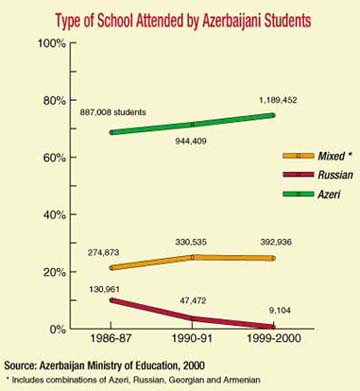  I remember that when
I had to give speeches at Party meetings, I used to prepare my
reports in Azeri. But I was never allowed to make any speech
in Azeri, so someone was assigned to translate for me. Even though
I spoke Russian with a heavy accent and wasn't nearly as fluent
in Russian as in Azeri, I was required to use Russian. I'm sure
that if Russian had prevailed after we gained our independence
and the emphasis had not shifted to Azeri, I would never have
been appointed as Deputy Minister of Education. I remember that when
I had to give speeches at Party meetings, I used to prepare my
reports in Azeri. But I was never allowed to make any speech
in Azeri, so someone was assigned to translate for me. Even though
I spoke Russian with a heavy accent and wasn't nearly as fluent
in Russian as in Azeri, I was required to use Russian. I'm sure
that if Russian had prevailed after we gained our independence
and the emphasis had not shifted to Azeri, I would never have
been appointed as Deputy Minister of Education.
I remember how parents used to ask me to recommend a good Russian
school for their children. Sometimes they themselves didn't even
speak Russian. Nevertheless, it was only natural that families
wanted to send their children to Russian schools - they wanted
the best for their children's future. Let's be frank. In many
cases, education in Russian language schools was superior. First
of all they had more textbooks and the quality was better. Even
pre-school and kindergarten classes were better.
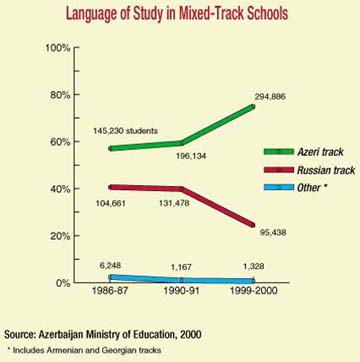  Of course, the Azeri
language was taught even at the Russian schools, but mostly on
a formal level, not at a very profound level. In fact, the Ministry
of Education itself stated that failure to pass exams in Azeri
would not be held against students, as the study of Azeri in
Russian-track schools was voluntary. Some Azerbaijanis didn't
even bother to take those classes; some even protested that such
classes were being offered. Of course, the Azeri
language was taught even at the Russian schools, but mostly on
a formal level, not at a very profound level. In fact, the Ministry
of Education itself stated that failure to pass exams in Azeri
would not be held against students, as the study of Azeri in
Russian-track schools was voluntary. Some Azerbaijanis didn't
even bother to take those classes; some even protested that such
classes were being offered.
I was educated in Azeri as were all four of my children. Even
though they went to school in the 1970s, when Russian was at
its most dominant, I sent them to Azeri schools. I respect the
Russian nation and language. But I think that if someone does
not love and understand his native culture, he cannot value other
cultures. As the educator Ushinski once said: "If a child
has not learned his native language by the time he is 11 or 12
years old, it will be difficult for him to learn foreign languages
later on."
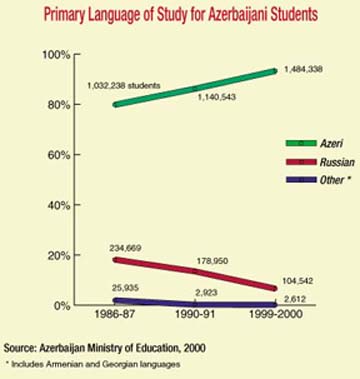  Azeri Language Azeri Language
Today the attitude towards Azeri has changed considerably. Of
course, Azeri has had official status as a State language since
1978 (along with Russian), but such prestige was just on paper.
In practical terms, Russian dominated.
After we gained our independence, a new Constitution was drawn
as guidelines for our new independent republic. When it was adopted
in November 1995 by a general referendum, the role of Azeri increased
substantially. Now the language is used everywhere at the official
level - socio-economical, cultural and political. It's required.
At State organizations, all correspondence and meetings are conducted
in Azeri, even though many of the decision-makers know Russian
better than Azeri.
The Azeri language has also become the language of instruction
in our schools. President Aliyev himself has emphasized the role
of Azeri several times in his speeches. When people don't speak
Azeri at high-level meetings, he openly criticizes them. The
President has told us several times: "We want our children
to be able to read Shakespeare in English, Pushkin in Russian
as well as some of the other world literature and scientific
works in their original languages. But at the same time, they
need to be able to read our own Azerbaijani poets, Nizami, Fuzuli
and Nasimi in Azeri. It's essential that we teach our children
correct and beautiful Azeri. Every Azerbaijani must be fluent
in the Azeri language."
Improving Azeri
Schools
The outlook for Azeri schools is improving. Now there are some
very strong Azeri schools, not only in Baku but in remote villages.
For example, Azerbaijani (not Russian) school students took third
place in an international mathematics contest last year. This
year, two pupils from an Azeri school took first place at the
national Mendeleyev Contest in Chemistry. These days the winners
of national school competitions are usually from Azeri schools;
several years ago, the winners usually had studied at Russian
schools. This fact itself shows that the attitude toward our
national language is improving; this process is strengthening
day by day.
Now parents call and ask me to help them find a good Azeri school.
This often surprises me as I would have expected such people
to choose a Russian school - they hold high positions and their
children speak excellent Russian. It looks like they are beginning
to understand how to value the historical reality and possibility
of national progress and prosperity through the use of our national
language.
Statistics also support this trend. In 1990-1991, out of 1,322,416
students, 14 to 15 percent of them were in non-Azeri tracks including
Russian, Armenian and Georgian. Today the figure has dropped
to 6 percent. This doesn't mean that there has been pressure
to transfer from Russian to Azeri schools. It has taken place
naturally. First of all, the ratio between Azeri speakers and
Russian speakers is changing in favor of Azeri. Second, Azerbaijanis
have come to realize the importance of Azeri in the political,
social and cultural life of the country. A patriotic attitude
toward the national language is being formed.
Strengthening Education
Our school programs and curricula are also improving, but it's
not an easy process. The curriculum still needs to be updated.
Literature textbooks need to include a greater selection of our
own authors. Right now, some of Azerbaijan's most important writers
who created their works during the Soviet period are totally
being neglected and ignored. Each literary work and writer must
be valued according to the period in which it was created - not
according to today's standards.
The method of teaching languages also needs to be changed. Have
we learned foreign languages like Russian or English from what
we studied at school? Not really. It's the same with Azeri. I
think we need to adopt new teaching methods, especially in language
learning. We need to take advantage of international experience
and teaching techniques. At the Ministry, we've already allotted
more hours for teaching Azeri, and now we require an Azeri exam
for Russian schools.
One of the important factors is that the new educational program
requires the teaching of Azeri on the level of State language
in non-Azeri track schools (Russian and Georgian).
Knowledge of Azeri is the key to learning and understanding our
own literature and our own mentality. Right now, Russian-track
students do not even know the works of such valuable writers
as Nizami, Fuzuli and Sabir because the Russian school curriculum
did not include intensive study of Azerbaijani literature. Our
goal is to create the same curriculum for Azeri schools and Russian
schools.
Of course, we can't expect to see sweeping changes overnight.
We have much to learn and we must be open to new ideas. At the
same time, we shouldn't blame our young people for not knowing
Azeri - it's not their fault. There are many young people who
don't know Azeri but are still patriotic and valuable for building
Azerbaijan's future. These young people comprise what we might
call our "golden fund."
I've always had deep confidence in the future of this nation.
I knew that Azeri would eventually gain its rightful place in
our culture. I was optimistic because I knew that no empire can
last forever, nor can it sustain itself, even for a long time.
People who are far from their native culture and tradition will
never be successful in building a nation. I'm not saying, "Don't
learn other languages." By all means, learn as many languages
as possible - but first of all, learn your own. As the great
educator Firudin bey Kocharli once said, "The mother tongue
is of moral value to the nation." May we always protect
and esteem this value. It is our moral duty.
From Azerbaijan
International
(8.1) Spring 2000.
© Azerbaijan International 2000. All rights reserved.
Back to Index AI 8.1 (Spring
2000)
AI Home |
Magazine
Choice
| Topics
| Store
| Contact
us
|





